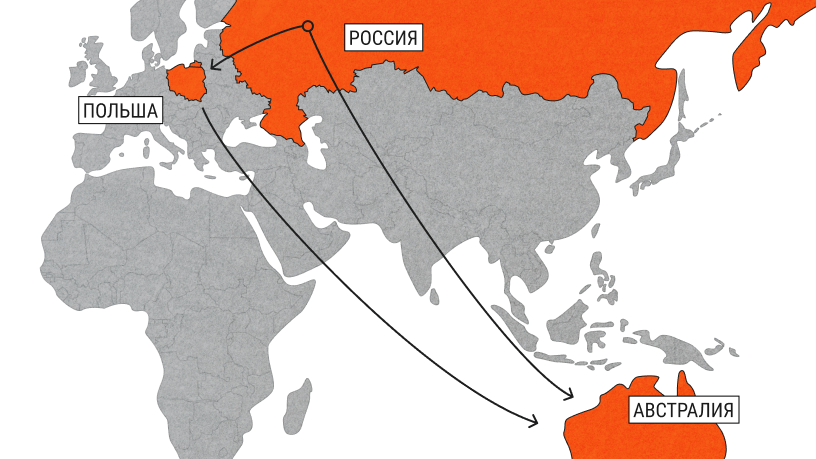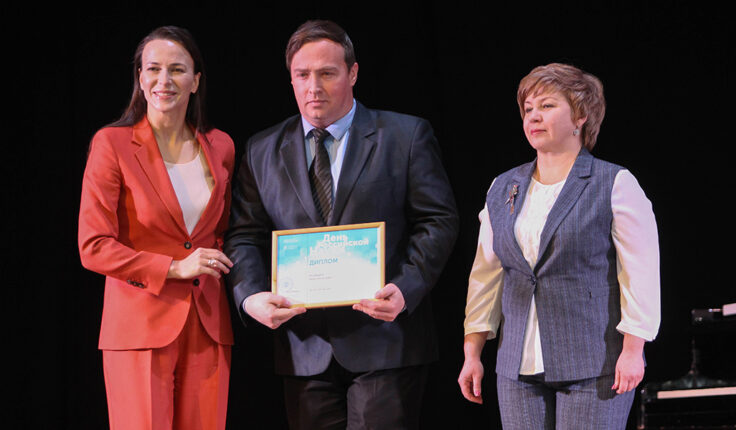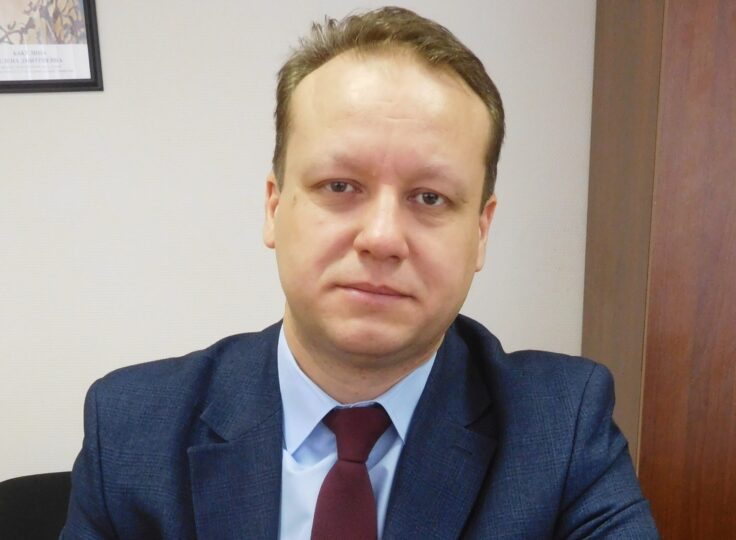
In previous issues of Plagiarism Navigator, we explored the journeys of Russian-language academic texts across various countries in Europe and Asia. Today’s issue tells the story of publications in Australian journals, intertwining the Zhukov-Fedyakin family clan from the Russian State Social University (RSSU), former Minister of Culture Vladimir Medinsky, former RSSU rector Natalia Pochinok, and a Kuban engineer who infiltrated Australia via a Polish journal.
Previously in Plagiarism Navigator
- Episode 1: China–Ukraine–Poland — The story of a Chinese scholar who defended a dissertation in Kharkiv, cobbled together from Russian-language works translated into Ukrainian.
- Episode 2: Russia–Tajikistan–Iran — The case of Iranian scholars obtained degrees in Tajikistan (2011–2013) under Russia’s VAK system.
- Episode 3: Russia–Serbia–Turkey–Switzerland–Lithuania — The tale of a Serbian academic who resorted to buying co-authorships and outright plagiarism.
- Episode 4: Russia–USA–Brazil–UK–Switzerland–India — A professor at Sechenov University who infiltrated an Iran-Iraq publication scheme in top Western journals, creating a lucrative paper mill within his own institution.
- Episode 5: Russia–Ukraine–Romania–India — The story of Andriy Vitrenko, Ukraine’s former deputy Minister of Education and Science, whose dissertation and academic papers were found to contain plagiarism.
- Episode 6: Russia–Ukraine — The tale of how wartime cross-border plagiarism became a commercialized scheme to boost academic metrics for Russian and Ukrainian scholars.
- Episode 7: Russia–Tajikistan–France — The journey of a humble Tajik accountant who rose to become the head of the country’s Academy of Sciences.
Back in 2019, Dissernet (a Russian academic integrity watchdog) uncovered a publication with translated plagiarism in an Australian journal. Three professors from Moscow universities took a publicly available Russian-language article, translated it into English, and submitted it to the journal in Australia. A year later, the article was published in another language and with new authors. What makes this publication stand out among hundreds of similar findings in journals worldwide? First, Russian authors rarely publish in Australia. Second, the original article was sourced from the Forbes magazine website, which has no connection to academic research. And third, the identity of one of the “authors” is particularly intriguing — Natalia Pochinok, then rector of the Russian State Social University (RSSU).
The first and most high-profile Dissernet’s investigation in 2013 focused precisely on this university. It revealed that RSSU was dominated by an entire family clan, which included:
- Honorary founding rector — Vasily Zhukov;
- Vice-rector — his wife, Galina Sevastyanovna Zhukova;
- Rector — their daughter, Lidiya Fedyakina (with a plagiarized dissertation);
- Vice-rector — their son-in-law, Vitaly Fedyakin (with a plagiarized dissertation);
- Senior lecturer — their younger daughter, Galina Zhukova (Russia’s youngest Doctor of Sciences, with two plagiarized dissertations).
The family patriarch, former RSSU rector Vasily Zhukov, not only handed over the position to his daughter and turned the university into a family-run “fiefdom” but also served for many years as the chair of the dissertation council. According to Dissernet, this council oversaw 20 dissertation defenses involving plagiarism, as well as one widely publicized defense without detected plagiarism, belonging to then-Minister of Culture Vladimir Medinsky. Zhukov likely orchestrated the entire defense of Medinsky’s dissertation (his third, following two with plagiarism). Dissernet closely monitored how, after a group of historians raised concerns, the minister’s case was reviewed by various councils for months until the Presidium of the Higher Attestation Commission (VAK) shielded him from public humiliation (despite its own Expert Council’s recommendation to strip him of his academic degree).
Top news on scientists’ work and experiences during the war, along with videos and infographics — subscribe to the T-invariant Telegram channel to stay updated.
The saga of the Zhukov-Fedyakin family clan, which also generated significant controversy, was abruptly terminated: the youngest Doctor of Sciences, Galina Zhukova, was stripped of her doctoral degree, the rector was dismissed “due to plagiarism in her dissertation” (though her degree was not revoked due to the statute of limitations), and eventually, the entire family left RSSU. However, this was hardly a triumph of truth and democracy — rather, Dissernet’s investigations likely aligned with the goals of influential figures seeking to replace this ruling clan.
In 2014, Natalia Pochinok, widow of former Russian government minister Alexander Pochinok, became RSSU’s new rector. Initially, her appointment was seen by many as a sign of progressive change at the university. However, as time passed without reforms, and after Dissernet reviewed Pochinok’s dissertations (as part of routine checks on university rectors), the reasons became clear. Natalia Pochinok (née Gribkova) defended her candidate’s dissertation in 2001, shortly after marrying her former professor — it’s possible that Alexander Pochinok assisted with her economics dissertation while she simultaneously pursued a second degree in law.
Unfortunately, her husband likely did not read the doctoral dissertation she defended four years later — otherwise, he would have noticed that she confused the expenditures of the U.S. consolidated budget with its revenues. There’s also no certainty that the dissertation’s author herself read her doctoral work, as Natalia was focused on advancing her career in leadership positions. Her dissertation contains significant plagiarism from three sources, along with elements of data falsification, such as including old data with updated timestamps to create the appearance of up-to-date research.
In Dissernet’s report “Rectors of Russia”, it is thoroughly explained why a rector with a plagiarized dissertation undermines any attempt to foster academic integrity. First, a plagiarist rector cannot combat student cheating, as they exemplify that academic dishonesty is rewarded. Second, such a rector is dependent on subordinates, unable to address their ethical violations due to their own compromised integrity. And third, a plagiarist rector is vulnerable to higher authorities, aware that they could be dismissed at any moment (as happened with Fedyakina).
In the aforementioned report, Natalia Pochinok ranked fifth in the list of Russia’s worst rectors, not solely due to her dissertation.

The period when Natalia Pochinok assumed the role of RSSU rector coincided with a surge in Russian authors’ publications in foreign journals indexed in Web of Science (WoS) and Scopus databases. This explosive growth stemmed from the zealous implementation of Russian Presidential Decree No. 599 (2012), “On Measures to Implement State Policy in Education and Science,” which offered substantial financial incentives for publishing in prestigious foreign journals, rewarding both authors and their institutions. According to an investigation by Novaya Gazeta, “half a billion rubles flowed past Russian universities and laboratories straight into the pockets of Indian and Pakistani publishers.”
RSSU, under Pochinok’s leadership, was deeply involved as well. According to a report by the Russian Academy of Sciences’ Commission on Countering the Falsification of Scientific Research, “Predatory Foreign Journals in Scopus and WoS: Translated Plagiarism and Unscrupulous Russian Authors”, RSSU ranked third among Russian universities for publishing in predatory journals indexed in Scopus and WoS, and fourth for publications with identified translated plagiarism.
Up-to-date videos on science during wartime, interviews, podcasts, and streams with prominent scientists — subscribe to the T-invariant YouTube channel!
At the individual level, the record-breaking star of this publication race was Ilya Medvedev, a physical education professor at RSSU’s Kursk branch and a Doctor of Biological and Medical Sciences. Medvedev published an enormous number of articles, initially in low-quality Russian journals — resulting in 255 of his publications appearing in journals excluded from the Russian Science Citation Index (RSCI) for poor quality — before switching to foreign predatory journals. For instance, in the predatory journal Research Journal of Pharmaceutical, Biological and Chemical Sciences (which published 1,597 articles by Russian authors in total), Medvedev alone had 170 publications in 2018, with one issue containing 42 of his articles.
A frequent co-author of Medvedev’s was another RSSU publication champion, Alexander Makhov. Makhov, a coach specializing in Paralympic sports, authored 34 monographs and textbooks and over 450 academic papers. At least six of his publications, co-authored with Medvedev, contain plagiarism accompanied by falsifications, primarily in bibliographies: fictitious citations added to artificially inflate citation metrics. In one paper, results from a study on deaf and hard-of-hearing athletes were verbatim copied into a fabricated study on athletes with Down syndrome.

Dissernet identified improper borrowings in at least twelve of Medvedev’s publications. While it’s physically impossible to review all of his works, even if we assume the rest are free of plagiarism, it’s clear that this flood of publications cannot contribute meaningful knowledge to humanity. Nevertheless, Medvedev’s efforts did not go unnoticed by his university: RSSU rector Natalia Pochinok awarded him the “Dedication to Science” prize.
In 2021, Pochinok abruptly left her post as RSSU rector. This had nothing to do with her plagiarized dissertation or Medvedev’s actions: her “voluntary” resignation followed an order temporarily suspending her from the position, citing Russia’s “Anti-Corruption Law.” After leaving RSSU, Pochinok briefly served as chair of the Public Chamber of Russia’s Commission on Social Policy, Labor Relations, and Veteran Support before seemingly transitioning fully to business ventures.
Let’s return to Natalia Pochinok’s publication in the Australian journal (recall that 2019 was the peak of RSSU’s artificial publication boom, and the “Anti-Corruption Law” had not yet surfaced in her biography). The International Journal of Innovation, Creativity and Change was included in a list of 94 predatory journals listed in the aforementioned Russian Academy of Sciences report on translated plagiarism. In addition to Pochinok’s article with co-authors, the journal published two articles purchased through the infamous Mezhdunarodny Izdatel (MI, International Publisher), a Moscow-based co-authorship marketplace, which we’ve covered extensively. For example, this investigation details how the MI inspired Sechenov University to establish its own publication-trading enterprise.
Among the articles purchased through the MI, one stands out with its neutral title, The Impact of Family and Society on Personality Formation. Its listed authors include a lawyer from Kazakhstan (who paid 32,200 rubles for the first co-authorship slot, ~$500 in 2020), a psychologist from Blagoveshchensk (28,700 rubles), a philosopher from Moscow (25,200 rubles), a philologist from St. Petersburg (21,700 rubles), and another philosopher from Yakutsk (18,200 rubles).
Now, let’s examine another form of spread of Russian pseudoscientific practices into Australia — this time from the Kuban region. In 2022, the Polish journal Curved and Layered Structures published an article by three authors. The first co-author was Sergey Shlykov from KubSTU (Kuban State Technological University), a prominent figure in Russia’s construction industry, an engineer with established recognition, a member of the Ministry of Construction’s standardization expert group, an expert for the “Reliable Builder of Russia” national contest, and a certified APEC international engineer.
As it turned out, the article was purchased through the same MI, with an offer appearing on the agency’s website in 2021. The listing revealed that Shlykov paid 73,800 rubles (~$1000 in 2021) for the first co-author slot. Likely due to the high cost, a fourth co-author advertised in the offer was not included, and the article proceeded with three authors. Shlykov’s two “co-authors” have at least 11 purchased publications each through the MI, one from Vladivostok and the other a pharmacist from Sechenov University.
Shlykov’s efforts paid off. By 2023, his affiliation in the article had suddenly changed from Kuban to Australia, as did his place of work.
Dissernet’s collection includes two more Australian journals with publications by Russian authors. The International Journal of Disaster Recovery and Business Continuity features two articles purchased through the MI, as usual, with a wide geographic spread of random co-authors: from Moscow to Vladivostok. The Journal of Contemporary Issues in Business and Government contains four articles with translated plagiarism, two of which list co-authors from Shlykov’s Kuban region.
Australia isn’t an easy place. A nation originally settled by transported convicts, it has managed to contend with the world’s most venomous snakes, dangerous saltwater crocodiles, and an invasive rabbit population that threatened to devastate its ecosystem, while also establishing medical care in remote areas through flying doctors. We hope that Australia will also address the infiltration of Russian pseudoscience.